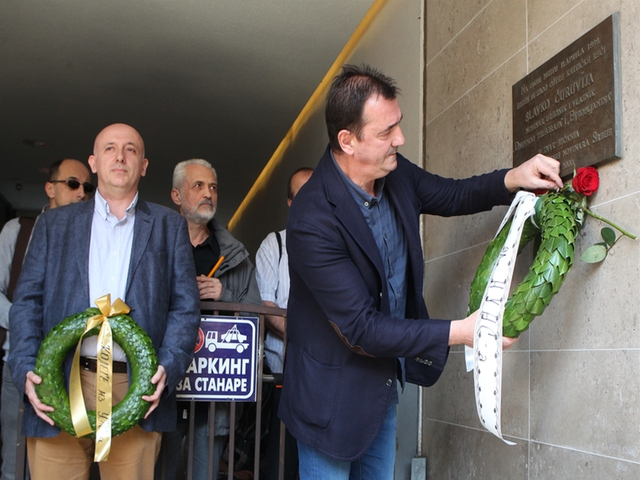
BELGRADE, 11.04.2017. – Relatives and colleagues of opposition journalist Slavko Curuvija marked the 18th anniversary of his death, expressing concern about the slow pace of the trial of Serbian security service officials for his murder.
The widow of murdered journalist Slavko Curuvija and officials from two Serbian journalists’ associations commemorated the anniversary of his murder by placing wreaths on Tuesday at the place where he was gunned down outside his apartment block in Belgrade in 1999.
Curuvija’s widow Branka Prpa told journalists that the murder had very serious consequences for Serbian society but she said that she had not given up hope because “if we give up hope, then we give up what is the best in ourselves”, Beta news agency reported.
“On this day we call on all colleagues not to forget what happened in 1999 and to fight for freedom of the media every day,” Vladimir Radomirovic of the Association of Journalists of Serbia, UNS, told the commemoration, according to Beta.
The commission for investigating unsolved murders of reporters raised concerns meanwhile that the ongoing trial of four former Serbian security service officials for the murder was progressing too slowly.
The trial opened at Belgrade special court in 2015, 16 years after Curuvija was shot dead, allegedly because of his opposition to Yugoslav President Slobodan Milosevic, and witness hearings are still not over yet.
“It is necessary to create a different dynamic for the hearings, and to consider this case as a priority one, because we waited so long for this process to begin,” the head of the commission, Veran Matic, told BIRN.
Ilir Gasi from the Slavko Curuvija Foundation, which promotes independent media and investigative journalism in Serbia, said he still doesn’t feel optimistic about finding those who are guilty of ordering Curuvija’s murder.
“We think that they will never discover who ordered that crime. Watching what is happening in court, we realised that they didn’t find any new information,” said Gasi.
Last week, former interior minister Dusan Mihajlovic and other high-ranking state security officials testified that the security service was involved in the murder and that documents about the case were destroyed after Slobodan Milosevic was ousted by an uprising on October 5, 2000.
Slavisa Lekic, the president of Independent Association of Journalists in Serbia, NUNS, said the trial was a farce and criticised the commission for alleged inaction.
“The commission is pretending that they are investigating the murders of reporters, but they actually didn’t move forward from the beginning. They are an alibi for PM [Aleksandar] Vucic and his conscience,” Lekic told BIRN.
At Tuesday’s commemoration, Lekic called for Serbian Prime Minister Vucic to be called to testify in court, because he was Minister for Information in the Milosevic government at the time Curuvija was shot.
The commission is also investigating several other cases, including the death in 1994 of Radislava ‘Dada’ Vujasinovic, a journalist who wrote investigative stories on wartime connections between criminals and politicians for weekly newspaper Duga. Last year new forensic analysis again failed to identify whether her death was suicide or murder.
It is also probing the murder of Milan Pantic, a correspondent for Vecernje Novosti newspaper from Jagodina in central Serbia in 2001, and the deaths of 16 journalists from national broadcaster RTS when its studios were hit by a NATO air strike in 1999.
According to the indictment in the Curuvija case, an ‘unknown person’ ordered the killing of the journalist, and Radomir Markovic, the former head of Serbian State Security, abetted the crime, while three former security service officers – Ratko Romic, Milan Radonjic and Miroslav Kurak – took part in the organisation and execution of the murder.
Kurak was the direct perpetrator, while Romic was his accomplice, it is alleged.
Three of the suspects have pleaded not guilty, while Kurak is on the run and is being tried in absentia.
Markovic is currently serving a 40-year sentence for the murder of former Serbian President Ivan Stambolic and other crimes, while Romic was acquitted alongside Radonjic in September last year of the attempted murder of opposition party leader Vuk Draskovic.
Even if Kurak is on the run, he could still influence witnesses, warned Veran Matic.
Matic said that because of this, it is vital to pursue him much more seriously.